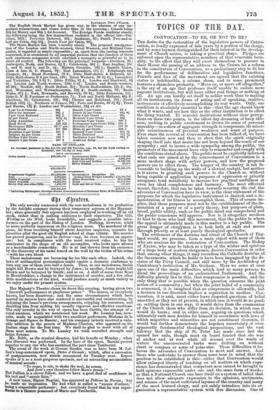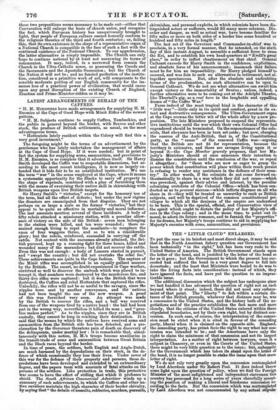TOPICS OF THE DAY.
CONVOCATION—TO BE, OR NOT TO BE P
TSB desire for the restoration of the legislative powers of Convo- cation, so loudly expressed of late years by a portion of the clergy, and by some laymen distinguished for their interest in the develop-. meat of Church action, is taking a practical shape. Pledges are enforced upon the representative members of that venerable form- ality, to the effect that they will exert themselves to procure in their House the passing of an address to the Crown for a reform in the constitution of Convocation, as a preliminary step to fit her for the performance of deliberative and legislative functions. Friends and foes of the movement are agreed that the existing status is indefensible, a solemn sham, and in some prominent features a shameless profanity. " Move on, or move off altogether," is the cry of an age that professes itself unable to endure mere pageant institutions, but will have either real things or nothing at all. An age can hardly set itself to nobler work than to making all its institutions, its forms of acting and of speaking, realities, instruments of effectively accomplishing its real wants. Only, one condition is absolutely essential to this—that the age should know what it wants, and see how this or the other institution is to effect the thing wanted. To remodel institutions without clear percep- tions on these two points, is the idlest day-dreaming of busy idle- ness, seeking in public excitement to drown its sense of personal unreality—in a show of aggregate strength to compensate its miser- able consciousness of personal weakness and want of purpose. Ever since the revival of Convocation has been talked of, we have taken occasion now and then to show that the spirit originally shaping itself into that desire has not been beyond the reach of our- sympathy ; and to insure a wide sympathy among the public, the promoters of the movement have only to remember and comply with the conditions stated above. The public must be explicitly in6rmed what ends are aimed at by the reinvestment of Convocation in a more modern shape with active powers, and how the proposed powers are to effect them. The temper of the country is not fa- vourable to building up the walls of a clerical cockpit, but neither is it averse to granting such powers to the Church as, without being capable of application to purposes of oppression or priestly arrogance, tend manifestly to increase her practical usefulness or even her ideal completeness and harmony. The most el:fectual means, therefore, that can be taken towards securing the end the advocates of Convocation have in view, is the, clear statement of the- purposes for which the legislative instrument is desired, and a de-- monstration of its fitness to accomplish them. This of course im- plies that those purposes must not be the establishment of the do- mination of a party or of a party theory, but purposes of plain, -broad, public utility, such as the public mind can comprehend and the public conscience will approve. Nor is it altogether needless to hint to those who lead this movement, that the public to whom 'the appeal is ultimately made in this matter is a lay public. The great danger of clergymen is to look both at ends and means through priestly or at least purely theological spectacles.
The settlement of the doctrine and ritual of the Church of Eng- land would, we presume, form a main object with most of those who are anxious for the restoration of Convocation. The Bishop of Exeter, who may be taken as a type of the wishes and opinions of a large body of zealous clergymen, desires Con vocation in order
that, among other things, it may reconfirm the Catholic doctrine of the Sacraments, which he holds to have been impugned by the de- cision of the Privy Council, and still more by the Archbishop of Canterbury's institution of Mr. Gorham. Here we come at once upon one of the main difficulties which lead so many persona era dread the proceedings of an ecclesiastical Parliament And the- difficulty plainly, lies in this, that compromise is possible, and the only thing that is possible when the question concerns the joint action of a community; but when the joint belief of a community is concerned, it is imagined that no compromise is allowable, but a decision in one direction implies a separation in another. Con- vocation, it is said, must either leave disputed questions of belief unsettled as they are at present, in which case it would do no good; or, settling them in one way, it would drive from the communion of the Church those who differ from its decision, in which case it would do harm ; and in either case, arguing on questions which ultimately each man decides for himself in accordance with laws of which majorities and minorities are not constituent elements, it would but further demonstrate the hopeless uncertainty, of even, apparently fundamental theological propositions, and the vast tideway that the ship of St. Peter has made since last she opened her sails, though most on board fancied that she was at anchor and at rest while all around over the waste of waters the unconsecrated barks were drifting on without chart or compass or sense of polar-star. These difficulties it be-. hoves the advocates of Convocation to meet and answer. And those who undertake to answer them most bear in mind that the position to be established is this—either that Convocation would allow enlarged liberty of teaching on all matters on which expe- rience has demonstrated that competent men cannot be brought to hold opinions expressible under one and the same form of words ; or that a National Church can base itself on a system of belief that does not allow adequate expression to the opinions, sentiments,
and science of the moat cultivated laymen of the into many of the most learned clergy, and yet safely introduce nto its or- ganization a representative system with free discussion. One of these two propositions seems necessary to be made out—either that Convocation will enlarge the basis of church union, and recognize the fact, which European history has unequivocally brought to light, that people of European culture cannot honestly conform to the religious theories of the third and fourth centuries ; or, failing this, that its own existence in the shape of a representative organ of a National Church is compatible in the face of such a fact with the continued existence of the National Church. To our apprehension, the latter alternative is simply impossible. The Church can only hope to continue national by at least not narrowing its terms of communion. It may, indeed, in a narrowed form remain the Church in the Ultra-Catholic sense, as possessing the Creeds and the Sacraments and the Apostolic Succession ; but the Church of the Nation it will not be ; and no fancied perfection of the institu- tion, considered as a primitive work of art, will compensate to the sensible moderate portion of our English community for the im- mense loss of a practical power of civilization, that would ensue upon any great disruption of the existing Church of England, Erastian and Prime-Minister-ridden as it may be.



























 Previous page
Previous page